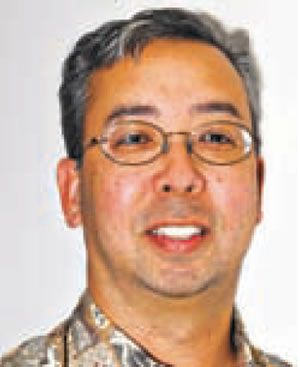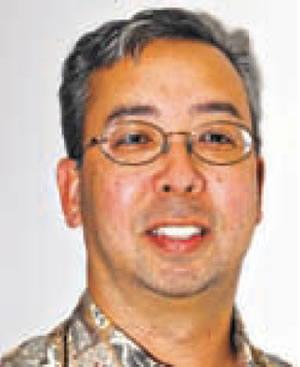Making Menopause Easier
Dr. Bradley W. Sakaguchi
Obstetrician and gynecologist at Straub Clinic & Hospital
Interviewed By Rasa Fournier
Where did you receive your schooling and training?
I was in the Army, so I went to the military medical school and trained as a general surgeon. When I got out of the Army I retrained in obstetrics and gynecology with the University of Hawaii at Kapiolani hospital.
How long have you been practicing?
I’ve been practicing obgyn for six years and general surgery for about nine years.
What are signs of menopause onset?
There is a difference between the onset, or what we call perimenopause, and actual menopause. Menopause by definition requires that a woman has not had a menstrual cycle for 12 months. By that time the hormone levels have reached a low point and most of those symptoms are resolved. When we really see all of the symptoms is in the time period we call perimenopause, which can vary in duration and intensity. The average American woman goes into menopause at the age of 51-and-a-half.
Perimenopause can start as much as five to seven years before actual menopause sets in. Perimenopause marks the time period where we see hormone levels start to decline.
When do perimenopause symptoms require intervention?
There’s the 60-20-20 rule. Sixty percent of women will sail through perimenopause and menopause with minimal effects on their life. Twenty percent will have moderate symptoms that affect their life, and they will typically seek some sort of treatment for it. The final 20 percent will have life-altering symptoms and need more intensive therapy.
Can you describe some of those symptoms?
There’s a constellation of symptoms. Hot flashes are No. 1. They can be mild, moderate or severe. Severe hot flashes interrupt a woman’s ability to function on a daily level, and they need immediate treatment for relief. There’s a general feeling of lack of energy, weight gain, decreased concentration, short-term memory loss, insomnia, fatigue and decreased libido. I give a talk called “The Perfect Storm.” Women in our society spend much of their 20s and 30s in childrearing. For men, that’s a very productive, professional time in their lives. Women often don’t hit their professional stride until the kids are well into high school and maybe even college. That is about age 45, so right when a woman is hitting her professional stride, menopause hits. At a time when you really need all of your pistons firing, all these symptoms can start, which can be very disruptive and concerning.
What treatment options are available?
The first thing we do is a comprehensive inventory of symptoms because there isn’t a single pill or treatment that will treat everything. We treat these things a la carte because treatment for menopause has to be individualized. In the old days it was estrogen, estrogen, estrogen everybody got it. That isn’t the case anymore. We are much more nuanced now. We know that there are risks and benefits to estrogen therapy.
The second thing is to give validation to their symptoms. They’re not going crazy. Many women are very familiar with hot flashes. What they’re not familiar with is the memory loss and the loss of concentration. Their immediate thought is: Am I getting Alzheimer’s? The vast majority of the time it’s not Alzheimer’s. The lack of libido is very concerning to women, especially at a time that the kids are now out of the house. Suddenly the husband has his wife back, she’s not just Mommy anymore. Just when it might be a time to renew intimacy, there’s a lack of libido, and maybe vaginal dryness, again part of the perfect storm scenario.
We talk about lifestyle. I tell women: Think of yourself as a 12-year-old, then think of yourself as an 18-year-old. You go from a child to a woman in six short years. And those were tumultuous times.
This is analogous unfortunately it’s in reverse, and in six or seven short years a woman is going to go through major changes. We give the adolescent a lot of leeway to mature into that 18-year-old space. We need to do the same thing for women going through menopause.
We talk about rededicating a woman’s lifestyle to this new body they’re entering into. If you haven’t exercised before, now is the time to do it. Many women who are 45-47 years old did not grow up in an exercise culture. It can be very intimidating to walk into a gym for the first time. Find a trainer who can give you baby steps into the exercise routine. We talk about diet, and the decreased caloric needs of an aging person, and avoiding sugars.
We also talk about giving yourself mental space. When you’re at work, if you’re having a hot flash, take a little mental time out. Instead of trying to ignore them, actually be more aware of your symptoms and deal with them head on. Reconnect with other women who are going through a similar thing. Don’t go through this alone. There are support groups for menopause both online and locally, but every woman has friends and family who have been through something similar. Men don’t go through the same type of symptoms, so it’s difficult for men to really relate.
One of the major symptoms women experience is irritability targeted toward people they’re close to: friends, close coworkers, their kids, husbands. They tend not to be irritable to people they don’t know. Until that irritability is dealt with, we can’t focus on the other symptoms.
The important thing for women to know is perimenopause is a real time in her life. It’s a real clinical entity and it’s treatable.







